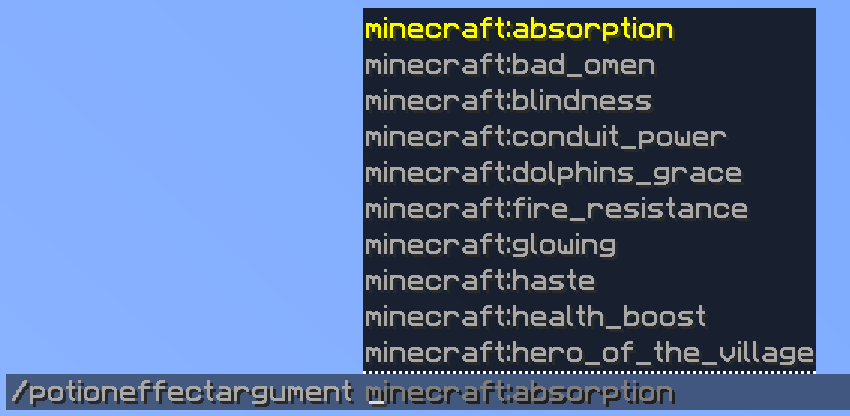Potion effect arguments

The PotionEffectArgument class represents Minecraft potion effects. When used, this argument is casted to Bukkit's PotionEffectType class.
Example - Giving a player a potion effect
Say we wanted to have a command that gives a player a potion effect. For this command, we'll use the following syntax:
/potion <target> <potion> <duration> <strength>
In this example, we utilize some of the other arguments that we've described earlier, such as the PlayerArgument and TimeArgument. Since duration for the PotionEffect constructor is in ticks, this is perfectly fit for the TimeArgument, which is represented in ticks.
new CommandAPICommand("potion")
.withArguments(new PlayerArgument("target"))
.withArguments(new PotionEffectArgument("potion"))
.withArguments(new TimeArgument("duration"))
.withArguments(new IntegerArgument("strength"))
.executes((sender, args) -> {
Player target = (Player) args[0];
PotionEffectType potion = (PotionEffectType) args[1];
int duration = (int) args[2];
int strength = (int) args[3];
// Add the potion effect to the target player
target.addPotionEffect(new PotionEffect(potion, duration, strength));
})
.register();
CommandAPICommand("potion")
.withArguments(PlayerArgument("target"))
.withArguments(PotionEffectArgument("potion"))
.withArguments(TimeArgument("duration"))
.withArguments(IntegerArgument("strength"))
.executes(CommandExecutor { _, args ->
val target = args[0] as Player
val potion = args[1] as PotionEffectType
val duration = args[2] as Int
val strength = args[3] as Int
// Add the potion effect to the target player
target.addPotionEffect(PotionEffect(potion, duration, strength))
})
.register()